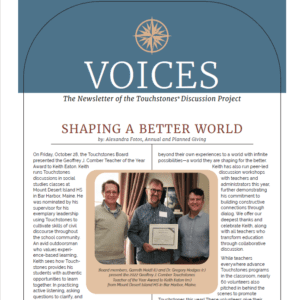By Stefanie Takacs
Over the last five months, we’ve become more acutely aware of distance. The word enters our daily language more times and ways than we realize. There is physical distance and social distance, though we are advised against using the latter term by mental health experts because humans need social connection. Prolonged social isolation can lead to feelings of loneliness, alienation, worthlessness, and a lack of belonging.
When we shifted overnight from an office in which we work together in person to remote operations, we took an additional step to make sure we stayed connected—not only with each other but also with teachers, volunteers, and other members of the Touchstones family. In March, we launched a community discussion program online that runs every other Saturday morning from 11 AM to noon, ET. To date, we’ve held seven discussions with a total of 26 different participants—joining in from southern California to coastal Maine and across the Canadian border in Northumberland County, Ontario. Each discussion brings up to 15 participants. Some are regular attendees and others come in as schedules permit. Friends invite friends and the Touchstones circle grows.
So, too, do our skills as a group. Our discussions primarily focus on issues tied to civil society, with participants examining the Touchstones texts, their own experiences, and current events in a dynamic interplay. These are not easy topics to discuss: racism, equity, exclusion, compassion, trauma, courage, responsibility, selflessness, anger, sexism, and tolerance. But the group, meeting after meeting, works in earnest commitment to the Touchstones ideal that together we are better than we are alone. After our meetings, group members often tell us how important these discussions are for them. “Thank you for the continued efforts you make to advance the mission of Touchstones in these challenging times,” wrote one participant. “To have the opportunity to share in the discussions we have explored recently is among the many gifts that have been afforded by this pandemic.” In return, we offer our thanks—to all who have been part of the community discussions so far and to those whose charitable support makes this work possible— and an invitation to everyone else to join us. You are welcome.



 Join the
Join the